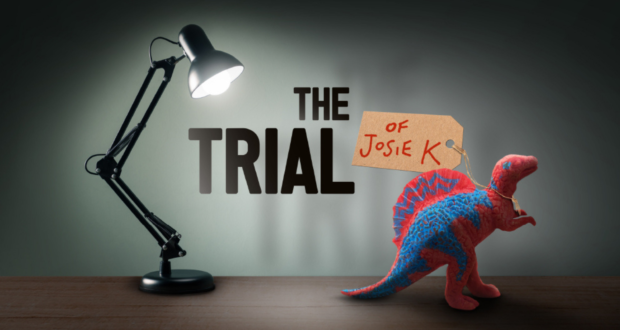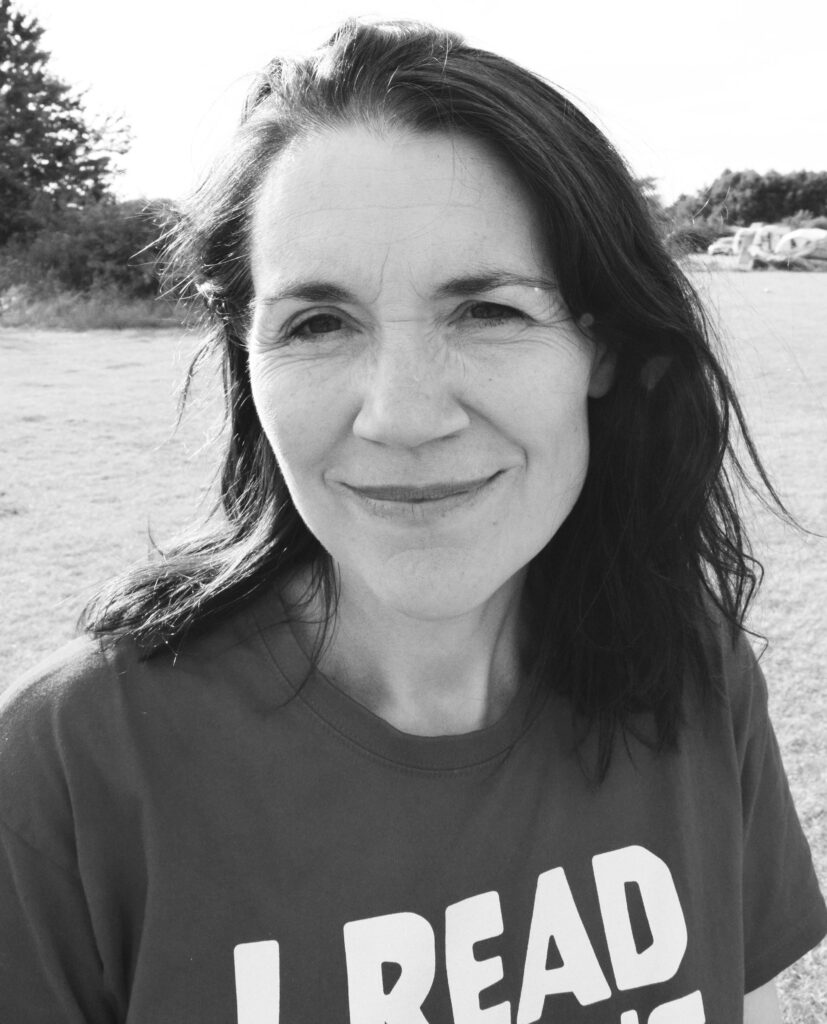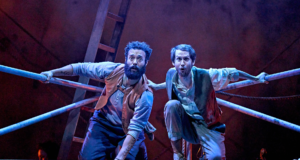Katie Hims on writing The Trial of Josie K for a younger audience
‘Kafka for kids?’ I hear you gasp! That’s exactly what we thought when we heard about The Trial of Josie K, which plays at the Unicorn Theatre from this week (26 January – 19 February). Inspired by Franz Kafka’s novel The Trial, it’s a production for older children (ages 9 to 13) and we were delighted to have the opportunity to put writer Katie Hims under examination to find out more about it.
Katie, this is an extraordinary idea, using a Kafka story to look at the difficulties felt by young people in their modern lives. How on Earth did you come by the connection?
Kafka’s novel can be read in a lot of ways. Was he writing about his own psychology or was he writing about the law, government and society? I think he was doing both. And I’m trying to do the same here. I was interested in writing about the guilt that children can sometimes carry around with them – for things that are not their fault or even in any way in their own control. Whether it be their parent’s divorce or any other difficult event. And I think that this feeling can be wholly inarticulated, or semi-hidden from the child themselves. So they have a feeling of guilt that they don’t entirely understand and cannot place. At the same time the way in which the world treats people and the way it functions can often exacerbate those feelings or create all new feelings of guilt! The Kafkaesque bureaucracy that we all – to a certain extent – have to operate in to live our day to day lives can always make a bad situation worse.
You’ve aimed the show at ages 9-13 – a time of life when children are not quite adults but are expected to start understanding adult responsibilities. How does the production speak to – and about – this audience and their world?
Our heroine Josie K has just started secondary school, and I think secondary school with all its new rules and its strange new corridors has plenty of Kafkaesque potential. There is a bewilderment to that experience. The world has expanded but at the same time you can feel like you yourself have shrunk – because you are now amongst the youngest people at your school rather than the eldest (as you were at primary school.) Parents are almost completely uninvolved in secondary school life so this new stage has to be navigated without their help.
Tell me about the character of the Bureaucrat. He’s a figure of authority that seems to fit into every sphere, from school to any part of society. Is that a deliberately open-ended choice?
I had to find someone to represent the bureaucratic system – someone who wasn’t simply a policeman or a judge. There are multiple characters in the novel – all kinds of legal figures and others who create fresh new problems for Kafka’s protagonist. We didn’t necessarily have the option of multiple characters because I knew I was only allowed three actors! Of course we could have had one actor wearing multiple hats but I felt that then we would lose the chance to watch Josie and the Bureaucrat’s relationship develop over time. One of the key points of Kafka’s novel is that the protagonist repeatedly fails to make a human connection with any of the people he encounters because they are all operating within a system that doesn’t allow for individuality, kindness or compassion. And I suppose this is where Kafka and I really diverge! I wanted to build a connection between Josie and the Bureaucrat because I wanted to write something a great deal more optimistic than the novel, not only because this adaptation has been written for young people, but because I myself am a more cheerful personality than Kafka!
Kafka is really good at using words to articulate the de-humanising power of authority. How do you think physically staging the story, rather than just reading it, adds to that, and particularly for a younger audience?
I don’t know! I don’t think it’s an easy read at all and getting the novel onto its feet potentially makes it more accessible than the book – certainly for young people. I think the novel does lend itself to being visualised – the surreal dreamlike claustrophobia is fun to stage and hopefully to watch. The situation Josie finds herself in is inherently dramatic. There’s a compelling question driving the novel and hopefully driving the play – what is she actually on trial for? Within the dialogue between all of the characters there’s quite a lot about the meaning and accuracy of language that I’m hoping reflects the fun that Kafka was having with words – if Kafka indeed ever found writing fun. I bet he did – despite his moaning about the job! But then most writers moan about the job so I shouldn’t single him out.
What might we expect from the staging? Is it likely to be complicated and convoluted, or straightforwardly obstructive? Is Josie on a journey or in a cell? Or perhaps both!
Josie is definitely not stuck in a cell! I would feel very bad putting Josie – who I really love – into a situation where she’s just stuck in a literal prison. Josie is fairly constantly on the move. And our set is like a gorgeous advent calendar in the colours of Refreshers (the sweets that come in pastel shades).
Kafka is renowned for being absurd and perhaps a bit bleak. Is your version of this story totally depressing, or does it have some humour and positive messaging within it?
I could not and would not try to write something for anyone – let alone young people – that had no positive message or humour. I think playwrights should above all attempt to be entertaining. I would choose entertainment over meaning. Although I don’t honestly believe you can have one without the other. I hope this play is funny. I really do. The novel can at times be funny – in a supersonically bleak way! I have tried very hard to write something fun and funny and optimistic. This adaptation process has felt like arm-wrestling Kafka. I’m still not sure who won. Hopefully the audience!
Thanks enormously to Katie Hims for taking the time to chat with us about this intriguing production.
The Trial of Josie K is on at the Unicorn Theatre from Thursday 26 January to Sunday 19 February and is aimed at ages 9-13. Further information and bookings can be found here.
 Everything Theatre Reviews, interviews and news for theatre lovers, London and beyond
Everything Theatre Reviews, interviews and news for theatre lovers, London and beyond




